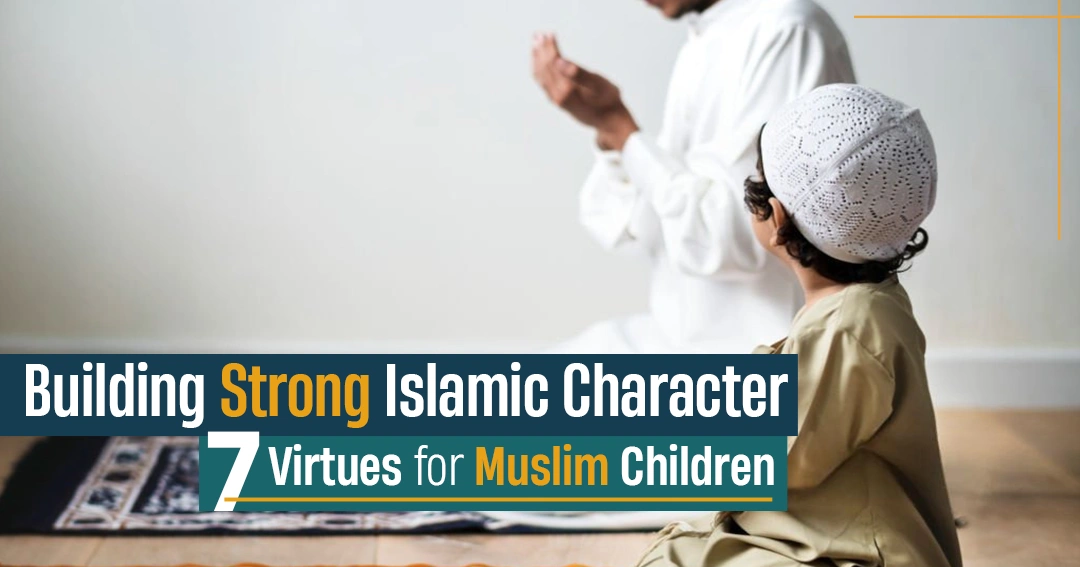Islamic character building for kids isn’t merely about teaching good manners, it’s about nurturing young hearts with the values of honesty, kindness, patience, and faith. With so many distractions in this world, leading children to grow up with strong Islamic morals ensures that they’re walking on the path of righteousness from their childhood.
In this article, we’ll explore seven essential virtues that lay the foundation for a strong Islamic character, and how parents can make this journey meaningful and fun.
Why Islamic Character-Building Matters for Kids?

Good manners are great to teach, yet Islamic character building for kids goes far beyond politeness. It is the foundation of a lifetime of faith, integrity, and emotional strength, and allows young Muslims to grow into confident and compassionate individuals who are led by Islamic values.
1. Spreading the Seeds of Faith in Kids at an Early Age
One of the main reasons Islamic character building for kids is so important is that it directly connects their behavior with their relationship with Allah.
When children understand that honesty, patience, kindness, and respect are things that Allah likes, they feel a stronger sense of purpose in acting on good character, not just to please parents and teachers, but to attain the pleasure of their Creator.
2. Building Emotional Intelligence through Islamic Values
Good character is not just about doing the right thing, it is also about developing self-control, empathy, and resilience. Islamic character building for kids gives them emotional strategies like sabr (patience), shukr (gratitude), and forgiveness that are essential for healthy social and emotional development.
3. Shaping Behavior Through a Higher Purpose
Another reason Islamic character building for kids is so effective is that it gives children a higher purpose behind their actions. Rather than telling children to simply “be nice,” we tell them why honesty, kindness, and respect are valued in Islam.
4. Building a Strong Muslim Identity in a Changing World
In today’s world, which is so rapid and frequently confusing, children need to have a solid foundation to stay grounded. Islamic character building for kids gives them that anchor, a clear, God-centered set of values to confront difficulty and peer pressure with confidence.
The 7 Key Virtues for Strong Islamic Character in Children

When it comes to Islamic character building for kid, learning major virtues can make good character and Islamic manners for kids easier to acquire and practice in life.
Following are seven primary traits that every Muslim child needs to be taught, each rooted in the Qur’an and Sunnah and explained in a way that builds the heart and mind.
1. Honesty (Sidq): Always Telling the Truth
Honesty is a pillar of noble character in Islam. Familiarizing kids to honesty not only build trust but also makes them tough in conscience. The Prophet Muhammad ﷺ was known as Al-Ameen (The Trustworthy) even before his prophethood, a clear sign of how important honesty is in our religion.
In character building for Muslim children, parents and teachers can highlight everyday scenarios in which truthfulness matters, even in small things like admitting mistakes. At Tareequl Jannah Academy, students learn from stories and interactive sessions that honesty is always the best policy.
2. Respect (Ihtiraam): Honoring Others with Words and Actions
Respect in Islam is more than an issue of polite speech, it’s an issue of recognizing the dignity of all human beings. Whether parents, teachers, elders, or even younger siblings, one of the Islamic character building for kids is that Islam teaches kids to be kind and considerate towards everyone.
Islamic personality development for kids includes learning respectfulness in prayer, in speech, and even online. Tareequl Jannah Academy allows kids to learn respect through live role-play and encouragement.
3. Compassion and Kindness (Rahma): Caring from the Heart
Allah is Ar-Rahman, Ar-Raheem, and as His servants, we are supposed to be compassionate too. Islamic character building for kids needs to include daily acts of kindness, from sharing toys to comforting a friend.
At Tareequl Jannah Academy, children learn about the stories of the Prophet ﷺ and how he treated animals, children, and even his enemies with kindness. Through these stories, children are encouraged to be kind in all walks of life.
4. Patience (Sabr): Being Calm in the Face of Adversities
Kids may find disappointment or delayed gratification difficult, but patience makes them emotionally. In Islam, patience is a virtue with great reward: “Indeed, Allah is with those who are patient” (Qur’an 2:153).
With the implementation of sabr during moments of frustration, Islamic character building for kids turns into a realistic, everyday mechanism.
5. Gratitude (Shukr): Being Thankful for Allah’s Blessings
Reciting Alhamdulillah is not merely a statement, it’s a mindset. Islamic character building for kids needs to encompass teaching children to count their blessings, thank Allah, and value people’s efforts.
6. Responsibility (Amanah): Being Trustworthy and Reliable
Amanah is being responsible and fulfilling it with commitment. Whether homework, house cleaning, or helping at home, responsibility is a massive Islamic character building for kids.
7. Forgiveness (Afw): Letting Go of Anger
Children often experience pain and conflict, but Islam has shown us to forgive others as we would want the forgiveness of Allah. Prophet Yusuf (AS) forgave his brothers, what an excellent example of mercy and strength.
Educating forgiveness in Islamic character building for kids enables children to release anger and gain emotional intelligence. At Tareequl Jannah Academy, children learn forgiveness through relatable stories and reflective activities.
How to Teach Islamic character Building for Kids?
Promoting Islamic character building for kids need not be overwhelming. With consistency, positive role models, and an enabling environment, both parents and teachers can play a lasting impact on children’s moral and spiritual growth.

The following are some simple, easy-to-implement tips to help you shape your child’s journey towards developing a strong Islamic character.
1. Model the Behavior You Want to See
Children learn by imitating the adults they are surrounded by. Whatever traits you want your child to gain, be it honesty, patience, or gratitude, practice them yourself. When children see Islamic values being implemented on a daily basis at home or in the classroom, they naturally imbibe them.
In order to help in the correct Islamic character building for kids, speak softly, forgive easily, and utter Islamic phrases like Bismillah, Alhamdulillah, and In shaa Allah frequently. Support these tendencies with your actions.
2. Create a Routine That Includes Islamic Values
Daily routines are great opportunities to teach Islamic character building for kids. From morning du’as to family prayer and Qur’anic stories at bedtime, routines bring consistency and intention into a child’s life.
Including Islamic character building for kids in these routines makes learning natural and easy. For further support, parents can attempt the highly organized programs in Tareequl Jannah Academy, where Islamic values are unobtrusively woven into each lesson.
3. Teach Values Through Stories and Role-Playing
Kids remember stories far more than lectures. Connect stories from the lives of the Prophets, the Sahabah, or even everyday stories from your own life to draw out virtues like courage, forgiveness, or trust in Allah.
Role-playing is also a great way of reinforcing Islamic character building for kids. Act out everyday situations, like losing a toy, sharing with a brother or sister, or making an error, and guide your child to respond with Islamic manners.
4. Promote Reflection and Positive Reinforcement
Encourage questions like: “What would the Prophet ﷺ do?” or “How can we handle this in a way that Allah will be pleased?” This challenges children to think harder and connect their actions to their faith.
Praise good character when you see it! Praise your child’s patience, honesty, or kindness. Positive reinforcement makes Islamic character building for kids a positive and uplifting experience.
If you found this article useful don’t forget to share it with your friends and family.
Help Your Child Grow with Beautiful Islamic Manners
Looking for practical ways to raise well-mannered, confident Muslim children? Explore our enriching collection of articles designed to teach kids the essential Islamic values every young Muslim should know.
From learning Islamic manners for children and building strong Islamic character, to mastering Islamic hygiene rules and masjid etiquette, each article is crafted to make Islamic teachings simple, relatable, and engaging for kids.
Plus, don’t miss the timeless wisdom of the Prophet ﷺ in our guide on Prophet Muhammad stories about manners for kids, and help your child learn the rights of neighbors in Islam and the proper Islamic way of speaking with love and respect.
Start reading now and guide your child toward becoming a well-rounded Muslim with beautiful adab and character.





